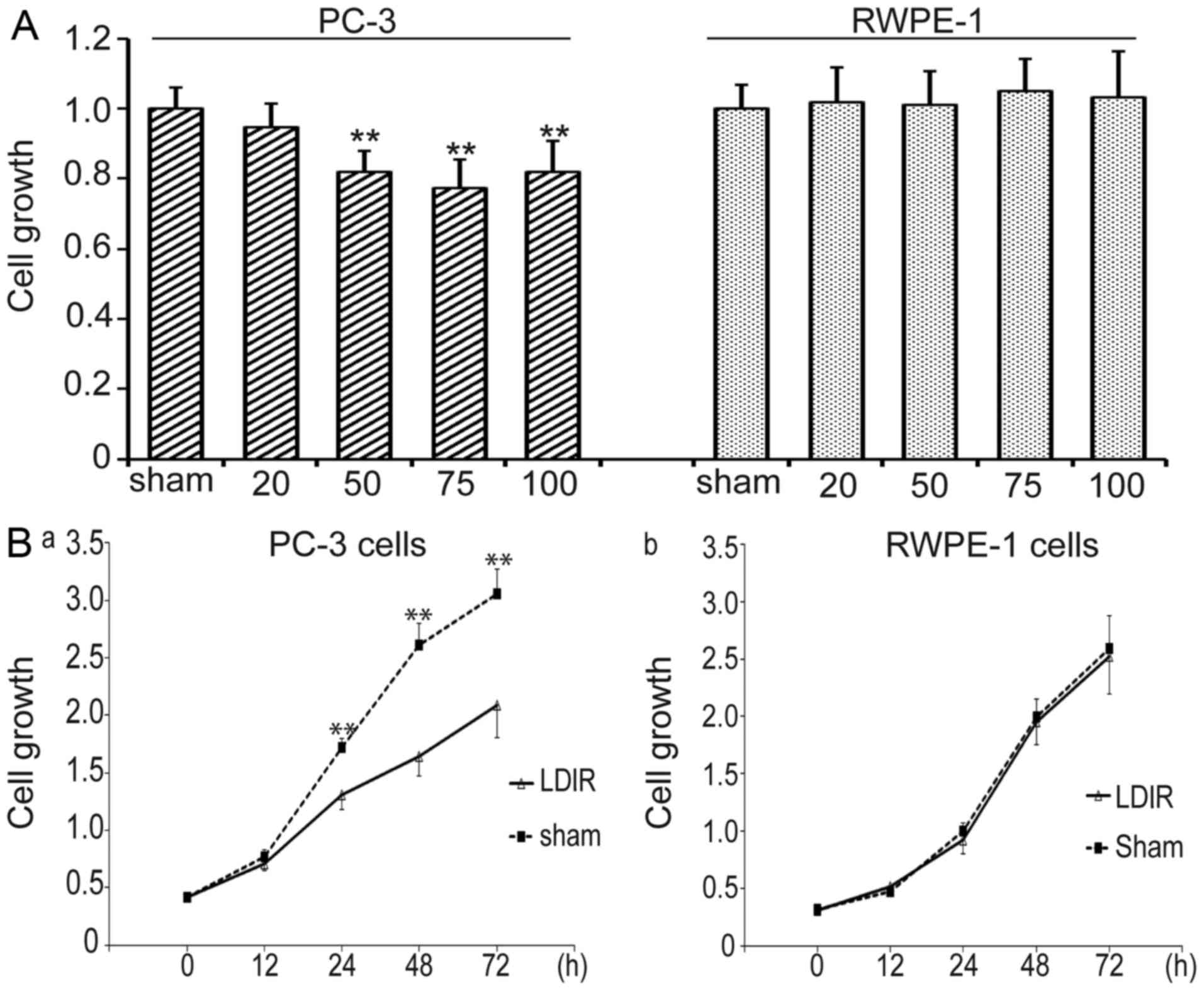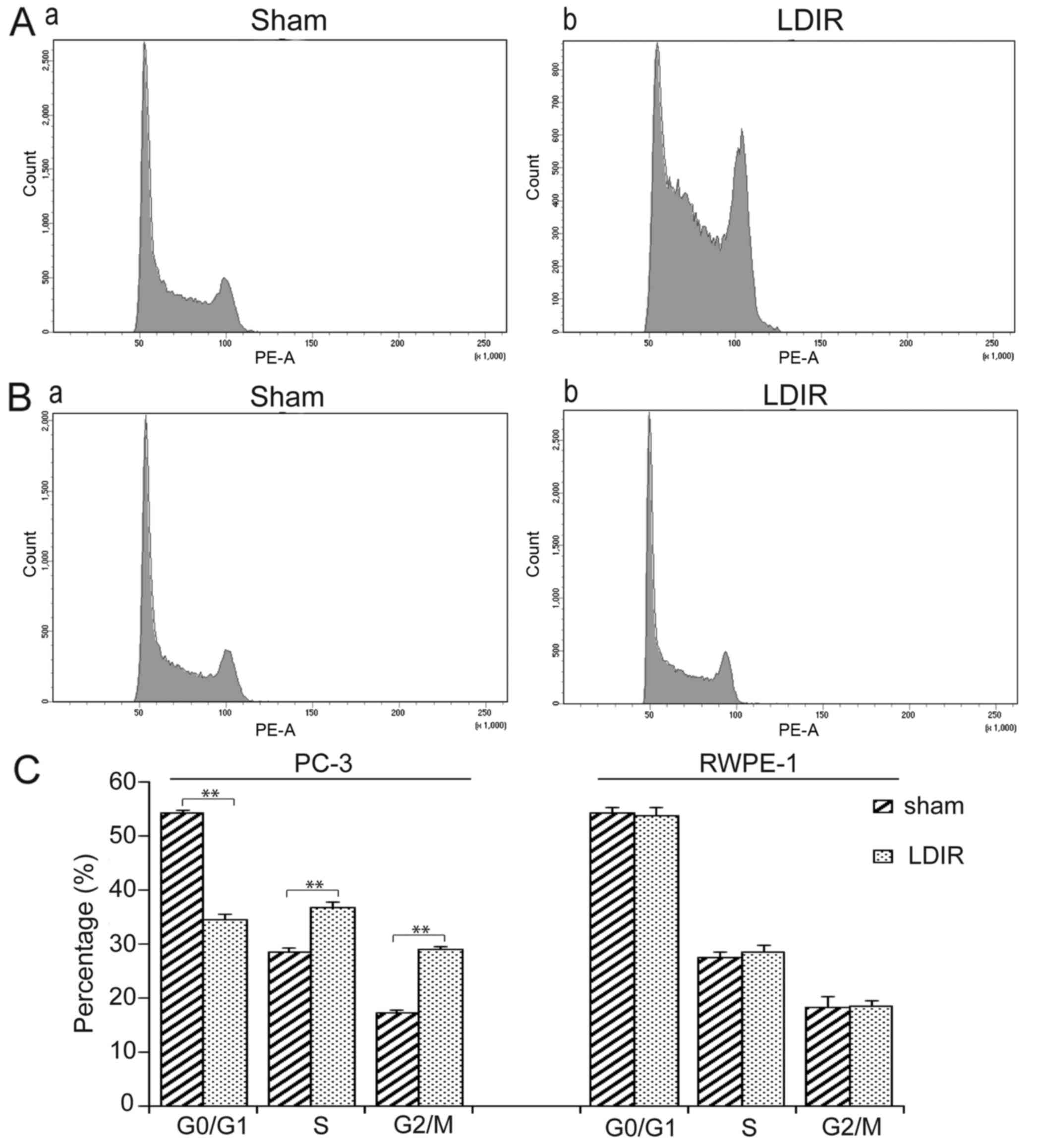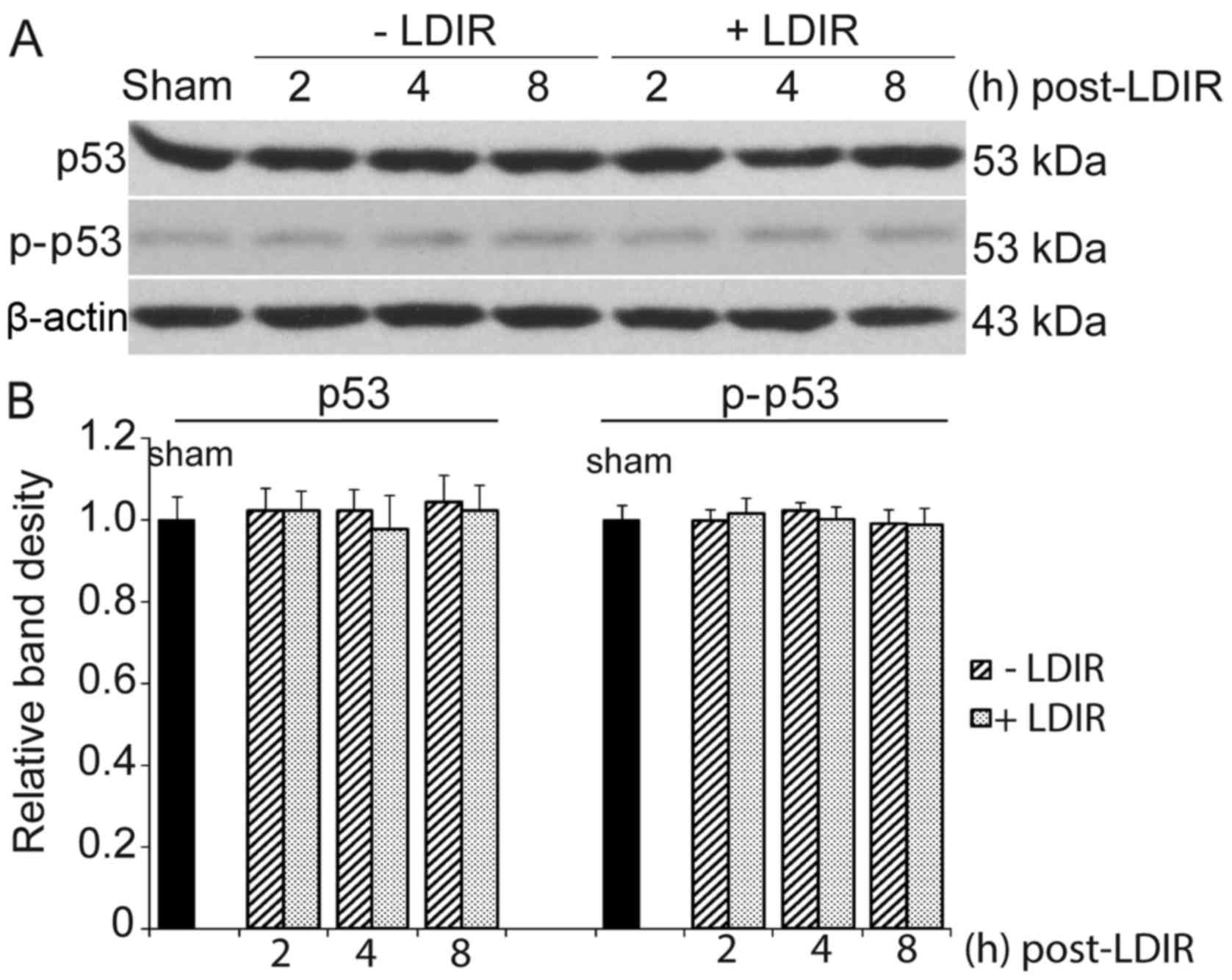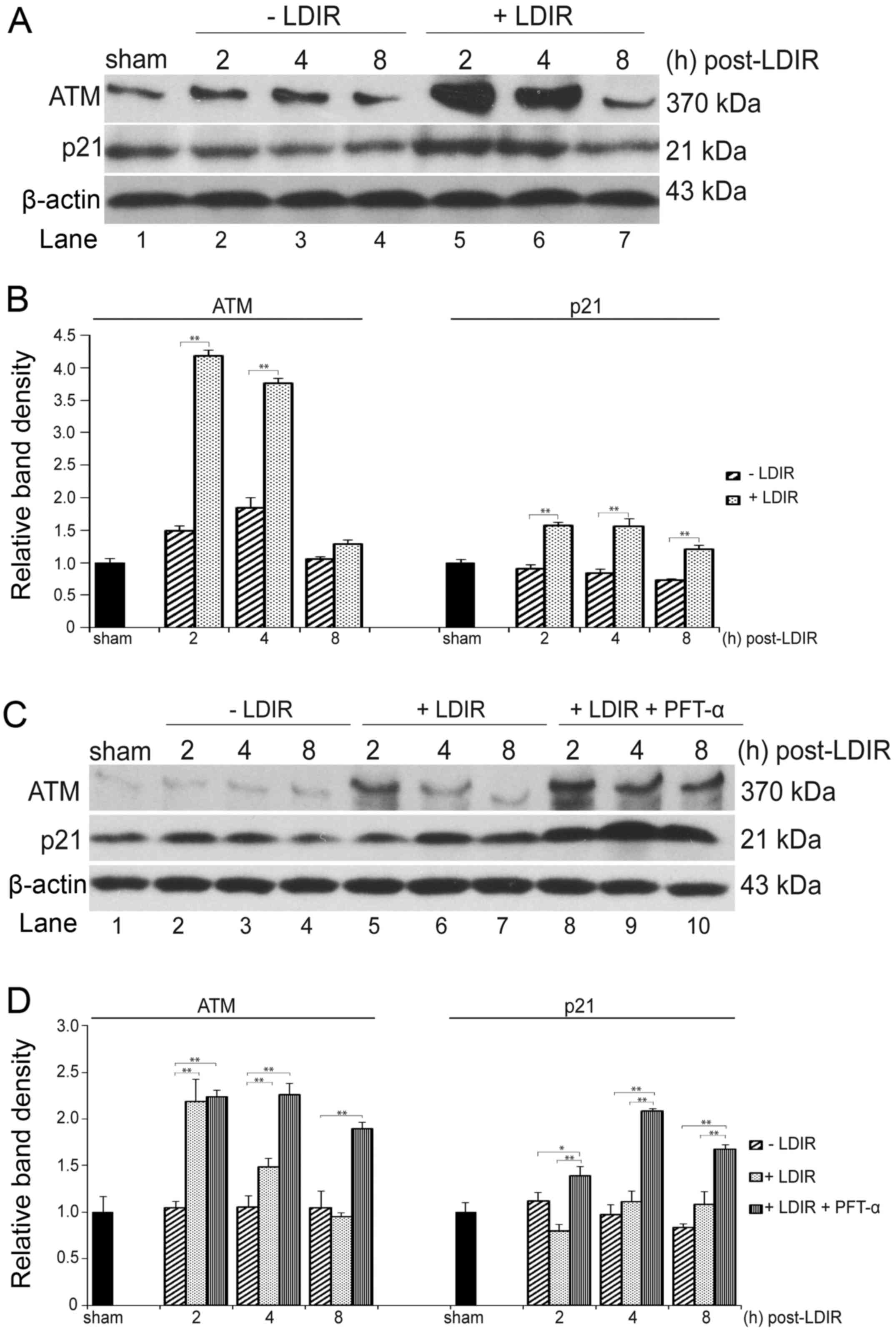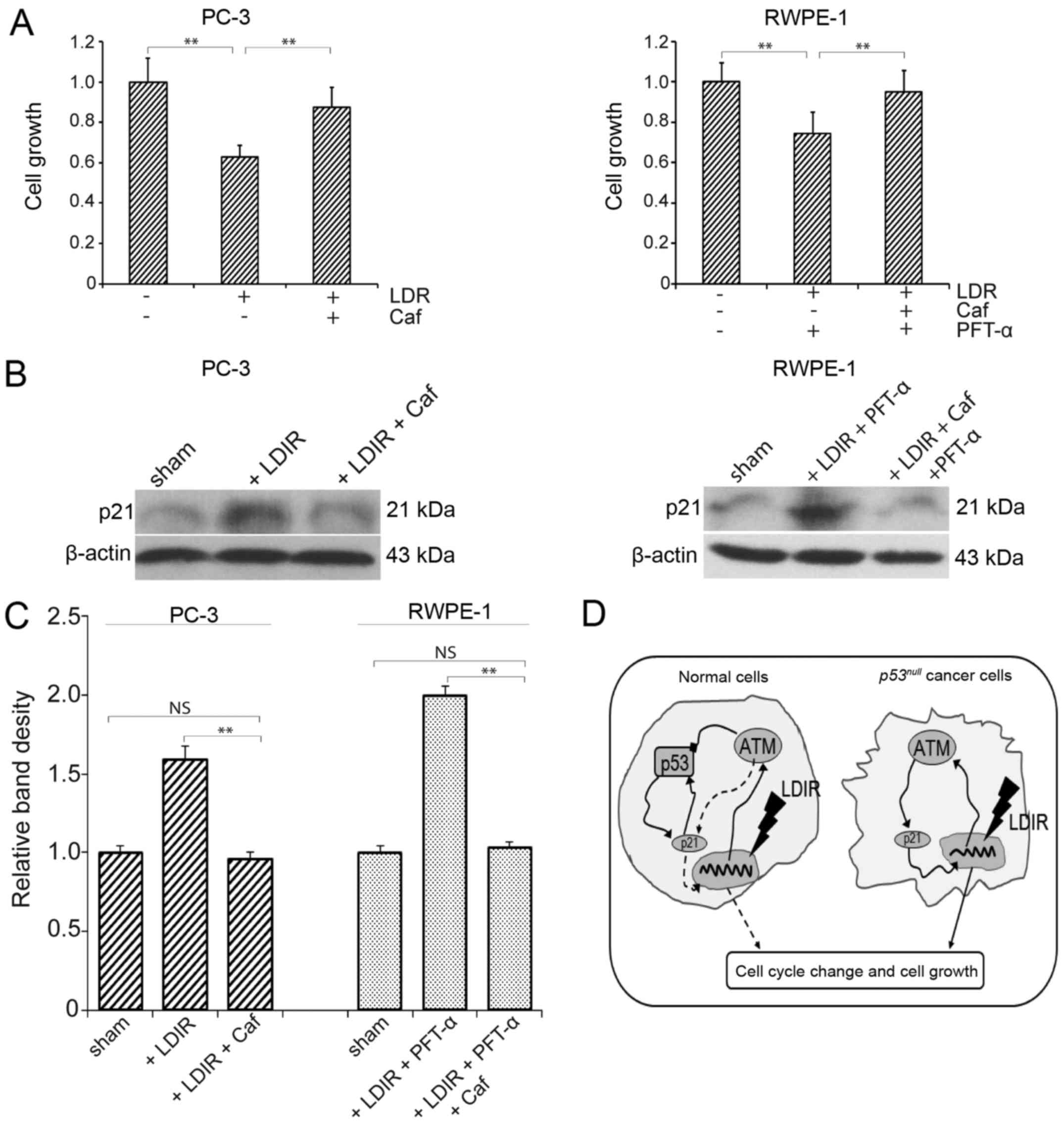|
1
|
Luckey TD: Physiological benefits from low
levels of ionizing radiation. Health Phys. 43:771–789. 1982.
View Article : Google Scholar : PubMed/NCBI
|
|
2
|
Feinendegen LE: Evidence for beneficial
low level radiation effects and radiation hormesis. Br J Radiol.
78:3–7. 2005. View Article : Google Scholar : PubMed/NCBI
|
|
3
|
Olivieri G, Bodycote J and Wolff S:
Adaptive response of human lymphocytes to low concentrations of
radioactive thymidine. Science. 223:594–597. 1984. View Article : Google Scholar : PubMed/NCBI
|
|
4
|
Li W, Wang G, Cui J, Xue L and Cai L:
Low-dose radiation (LDR) induces hematopoietic hormesis:
LDR-induced mobilization of hematopoietic progenitor cells into
peripheral blood circulation. Exp Hematol. 32:1088–1096. 2004.
View Article : Google Scholar : PubMed/NCBI
|
|
5
|
Liang X, So YH, Cui J, Ma K, Xu X, Zhao Y,
Cai L and Li W: The low-dose ionizing radiation stimulates cell
proliferation via activation of the MAPK/ERK pathway in rat
cultured mesenchymal stem cells. J Radiat Res (Tokyo). 52:380–386.
2011. View Article : Google Scholar
|
|
6
|
Jiang H, Xu Y, Li W, Ma K, Cai L and Wang
G: Low-dose radiation does not induce proliferation in tumor cells
in vitro and in vivo. Radiat Res. 170:477–487. 2008. View Article : Google Scholar : PubMed/NCBI
|
|
7
|
Yang G, Kong Q, Wang G, Jin H, Zhou L, Yu
D, Niu C, Han W, Li W and Cui J: Low-dose ionizing radiation
induces direct activation of natural killer cells and provides a
novel approach for adoptive cellular immunotherapy. Cancer Biother
Radiopharm. 29:428–434. 2014. View Article : Google Scholar : PubMed/NCBI
|
|
8
|
Torre LA, Bray F, Siegel RL, Ferlay J,
Lortet-Tieulent J and Jemal A: Global cancer statistics, 2012. CA
Cancer J Clin. 65:87–108. 2015. View Article : Google Scholar : PubMed/NCBI
|
|
9
|
Cho E, Mostaghel EA, Russell KJ, Liao JJ,
Konodi MA, Kurland BF, Marck BT, Matsumoto AM, Dalkin BL and
Montgomery RB: External beam radiation therapy and abiraterone in
men with localized prostate cancer: Safety and effect on tissue
androgens. Int J Radiat Oncol Biol Phys. 92:236–243. 2015.
View Article : Google Scholar : PubMed/NCBI
|
|
10
|
Savitsky K, Sfez S, Tagle DA, Ziv Y,
Sartiel A, Collins FS, Shiloh Y and Rotman G: The complete sequence
of the coding region of the ATM gene reveals similarity to cell
cycle regulators in different species. Hum Mol Genet. 4:2025–2032.
1995. View Article : Google Scholar : PubMed/NCBI
|
|
11
|
Suzuki K, Okada H, Yamauchi M, Oka Y,
Kodama S and Watanabe M: Qualitative and quantitative analysis of
phosphorylated ATM foci induced by low-dose ionizing radiation.
Radiat Res. 165:499–504. 2006. View
Article : Google Scholar : PubMed/NCBI
|
|
12
|
Viniegra JG, Martínez N, Modirassari P,
Hernández Losa J, Parada Cobo C, Sánchez-Arévalo Lobo VJ, Aceves
Luquero CI, Alvarez-Vallina L, Ramón Y, Cajal S, Rojas JM, et al:
Full activation of PKB/Akt in response to insulin or ionizing
radiation is mediated through ATM. J Biol Chem. 280:4029–4036.
2005. View Article : Google Scholar
|
|
13
|
Ahmed KM, Nantajit D, Fan M, Murley JS,
Grdina DJ and Li JJ: Coactivation of ATM/ERK/NF-kappaB in the
low-dose radiation-induced radioadaptive response in human skin
keratinocytes. Free Radic Biol Med. 46:1543–1550. 2009. View Article : Google Scholar : PubMed/NCBI
|
|
14
|
Lee CL, Blum JM and Kirsch DG: Role of p53
in regulating tissue response to radiation by mechanisms
independent of apoptosis. Transl Cancer Res. 2:412–421. 2013.
|
|
15
|
Menon V and Povirk L: Involvement of p53
in the repair of DNA double strand breaks: Multifaceted Roles of
p53 in homologous recombination repair (HRR) and non-homologous end
joining (NHEJ). Subcell Biochem. 85:321–336. 2014. View Article : Google Scholar : PubMed/NCBI
|
|
16
|
Freed-Pastor WA and Prives C: Mutant p53:
One name, many proteins. Genes Dev. 26:1268–1286. 2012. View Article : Google Scholar : PubMed/NCBI
|
|
17
|
Kim GD, Choi YH, Dimtchev A, Jeong SJ,
Dritschilo A and Jung M: Sensing of ionizing radiation-induced DNA
damage by ATM through interaction with histone deacetylase. J Biol
Chem. 274:31127–31130. 1999. View Article : Google Scholar : PubMed/NCBI
|
|
18
|
Jiang H, Li W, Li X, Cai L and Wang G:
Low-dose radiation induces adaptive response in normal cells, but
not in tumor cells: In vitro and in vivo studies. J Radiat Res
(Tokyo). 49:219–230. 2008. View Article : Google Scholar
|
|
19
|
Canman CE, Lim DS, Cimprich KA, Taya Y,
Tamai K, Sakaguchi K, Appella E, Kastan MB and Siliciano JD:
Activation of the ATM kinase by ionizing radiation and
phosphorylation of p53. Science. 281:1677–1679. 1998. View Article : Google Scholar : PubMed/NCBI
|
|
20
|
Xie H, Li C, Dang Q, Chang LS and Li L:
Infiltrating mast cells increase prostate cancer chemotherapy and
radiotherapy resistances via modulation of p38/p53/p21 and ATM
signals. Oncotarget. 7:1341–1353. 2016. View Article : Google Scholar :
|
|
21
|
Huang CY, Chang CW, Chen CR, Chuang CY,
Chiang CS, Shu WY, Fan TC and Hsu IC: Extremely low-frequency
electromagnetic fields cause G1 phase arrest through the activation
of the ATM-Chk2-p21 pathway. PLoS One. 9:e1047322014. View Article : Google Scholar : PubMed/NCBI
|
|
22
|
Roos WP, Thomas AD and Kaina B: DNA damage
and the balance between survival and death in cancer biology. Nat
Rev Cancer. 16:20–33. 2016. View Article : Google Scholar
|
|
23
|
Lin K, Adamson J, Johnson GG, Carter A,
Oates M, Wade R, Richards S, Gonzalez D, Matutes E, Dearden C, et
al: Functional analysis of the ATM-p53-p21 pathway in the LRF CLL4
trial: blockade at the level of p21 is associated with short
response duration. Clin Cancer Res. 18:4191–4200. 2012. View Article : Google Scholar : PubMed/NCBI
|
|
24
|
Dotto GP: p21(WAF1/Cip1): More than a
break to the cell cycle? Biochim Biophys Acta. 1471:M43–M56.
2000.PubMed/NCBI
|
|
25
|
Cao L, Kawai H, Sasatani M, Iizuka D,
Masuda Y, Inaba T, Suzuki K, Ootsuyama A, Umata T, Kamiya K, et al:
A novel ATM/TP53/p21-mediated checkpoint only activated by chronic
γ-irradiation. PLoS One. 9:e1042792014. View Article : Google Scholar
|
|
26
|
Pang LY, Scott M, Hayward RL, Mohammed H,
Whitelaw CB, Smith GC and Hupp TR: p21(WAF1) is component of a
positive feedback loop that maintains the p53 transcriptional
program. Cell Cycle. 10:932–950. 2011. View Article : Google Scholar : PubMed/NCBI
|
|
27
|
Luo JL, Cao JP, Zhu W, Feng S, Sheng FJ,
Zhu CY and Zheng SY: Interaction between ATM and
radiation-activated phosphorylation of P53 and P21. Ai Zheng.
24:1059–1063. 2005.In Chinese. PubMed/NCBI
|
|
28
|
Aliouat-Denis CM, Dendouga N, Van den
Wyngaert I, Goehlmann H, Steller U, van de Weyer I, Van Slycken N,
Andries L, Kass S, Luyten W, et al: p53-independent regulation of
p21Waf1/Cip1 expression and senescence by Chk2. Mol Cancer Res.
3:627–634. 2005. View Article : Google Scholar : PubMed/NCBI
|















